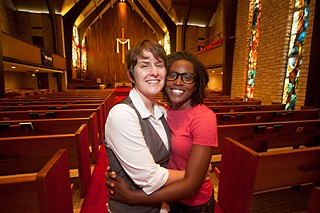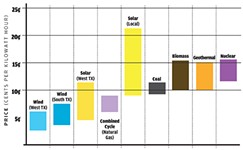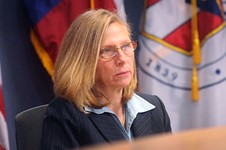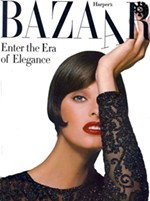Keeping the Faith
Lesbian couple seeks ordination
By Brandon Watson, Fri., May 3, 2013
Mary Ann Kaiser and Annanda Barclay know they are bucking tradition. But when the Christian tradition includes an ungodly brew of misogyny, racism, and homophobia, bucking is not always a bad thing. Yet despite the burdens of history, they believe Christianity has a central message of love. By both seeking ordination – Kaiser as a Methodist minister, Barclay a Presbyterian – they aim to put that love into practice.
Unfortunately for Kaiser, ordination may have some complications. While Barclay's Presbyterian faith has welcomed gay and lesbian clergy since 2011, the United Methodist Church allows gay and lesbian ordination only under the condition that the person cannot be a "self-avowed, practicing homosexual." Since she plans to exchange marital vows with Barclay in Maryland in the fall, Kaiser is barred by UMC law.
Nonetheless, Kaiser is still pursuing her path. She does so with the full support of the University United Methodist Church, where she serves as social justice and youth ministry director. UUMC Senior Pastor Dr. John Elford says the support was readily forthcoming. "Our church council voted almost unanimously to recommend her as a candidate for the ministry. Opposition has been almost negligible; but we are concerned. At some point, given that it's Texas and given the attitudes that some people have, I think we're all afraid that she's going to be told 'no, you can't do this, you can't be ordained as a deacon.' We feel for what that would mean for her, but she's going to continue on and do excellent ministry wherever she is."
Kaiser seems to take that potential opposition in stride. "Same-sex marriage, same-sex couples undo the patriarchal framework, which can be scary if that's the framework that one has only known or operated out of. It seems like your whole system of being unravels. I feel a lot of it is looking at it in fear."
The couple is quick to point out that their home churches have been completely supportive. Kaiser says of UUMC, "They are fantastic. I really couldn't talk positively enough about the people who make up that church. They continually impress me and they will be absolutely thrilled to celebrate Annanda's and my union without question. It will not even be a blink of the eye for them." Barclay chimes in: "Same with Central Presbyterian. They've been at it for years, several years. Nothing but love and support."
But the couple realizes that such inclusiveness is far from the norm. Neither the United Methodist nor the U.S. Presbyterian church will recognize their upcoming marriage. Indeed, both churches have struggled with the issue for years. According to Elford, when UUMC joined the Reconciling Ministries Network, a group aiming to change the UMC Book of Discipline's anti-LGBT language, a prominent blogger asked the church hierarchy to discipline the church. The U.S. Presbyterian church, meanwhile, debated for years before allowing gay and lesbian clergy, and, in protest of the change, 500 churches left the denomination. The pair says the strife motivates many LGBT persons to choose a secular life.
Barclay says "a lot of queers are afraid to come to church and rightfully so, because they don't want to be spiritually abused, or they're afraid for their safety due to others' spiritual beliefs. This is similar to 40-60 years ago when the same could be said about women and people of color. I feel like people fail to see the pattern of history, in terms of people groups being marginalized. But I do not think that's a reflection of Christianity as a religion. I think it's a reflection of people's biblical interpretations."
In fact, both Barclay and Kaiser toyed with leaving the church. Kaiser admits, "I was struggling with whether or not I believed that even the progressive church heals as much as it harms. Being in seminary was a funny way of pulling out of the church, because still I was in theological books all day, reading scriptures and whatnot. I just had to do a lot of searching on whether or not I was contributing to something harmful if I went back to it."
Barclay agrees: "In college, I felt that the church talked a lot of stuff but really didn't back much up. Or if they did, I really felt it was done on a surface level. You do a mission trip in Haiti, but then you can leave Haiti behind – but to go five miles away and deal with homelessness in your neighborhood, that's too icky."
"But one thing that the progressive church can offer," Kaiser continues, "is that the Sunday morning community offers time to look inside yourself and to see what prejudices are there." And the couple does see signs that things are getting better. Kaiser beams, "It has really changed a lot in the last few years. Hopefully, as the church becomes more inclusive, people will become slowly more comfortable revealing parts of our lives that are not traditionally allowed or even known about."
Barclay agrees. "Dualism is an unfortunate reality, that people think they have to live that way, queer and straight alike," she says. "My hope is that someday people realize that Christianity is not an either-or. I hope the church gets that. It's a 'both-and.'"
Got something to say on the subject? Send a letter to the editor.











